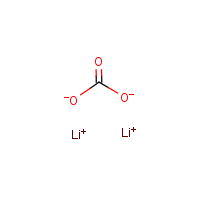Lithium carbonate
Agent Name
Lithium carbonate
CAS Number
554-13-2
Formula
C-H2-O3.2Li
Major Category
Other Classes

Synonyms
CP 15467-61; CP-15467-61; Camcolit; Candamide; Carbolith; Carbolitium; Carbonic acid lithium salt; Carbonic acid lithium salt (Li2CO3); Carbonic acid, dilithium salt; Ceglution; Dilithium carbonate; Eskalith; Eutimin; Hypnorex; Limas; Liskonum; Litard; Lithane; Lithea; Lithicarb; Lithinate; Lithionate; Lithium Phasal; Lithium carbonate; Lithium carbonate (Li2CO3); Lithizine; Litho-Carb; Lithobid; Lithonate; Lithotabs; Liticar; Manialith; Maniprex; Micalith; Neurolepsin; Pfi-lithium; Pfl-Lithium; Phasal; Plenur; Priadel; Quilonorm; Quilonum retard; Teralithe [French]; [ChemIDplus]
Category
Salts, Basic
Description
White powder slightly soluble in water; [CAMEO]
Sources/Uses
"A lithium salt, classified as a mood-stabilizing agent. Lithium ion alters the metabolism of biogenic monoamines in the central nervous system, and affects multiple neurotransmission systems." [ChemIDplus] Used in medicine for the treatment of bipolar depression and in manufacturing as a flux (glasses, enamels, and ceramics), additive (control cement setting times and produce aluminum, luminescent paints, vanishes, and dyes), coating (arc-welding electrodes), and catalyst; [CHEMINFO]
Comments
When dissolved in water, it is a strong irritant. [CAMEO] A 1% solution is an irritant with a pH of 11.2. It is poorly absorbed through the skin and has a vapor pressure of approximately zero. When used therapeutically, doses higher than 500-1800 mg/day may cause GI symptoms, thyroid dysfunction, muscle cramps, kidney injury, tremors, and convulsions. Persistent neurological symptoms have occurred after accidental or suicidal overdoses. Lithium salts cause developmental toxicity in humans at therapeutic doses (not in the occupational setting) with increased risk for major malformations, particularly cardiac, in the developing fetus. The minimum dietary requirement for lithium is probably less than 25 ug/day, and the average intake is about 100-2600 ug/day. [CHEMINFO]
Biomedical References
Exposure Assessment
MAK
0.2 mg/m3, inhalable fraction, as Li
Adverse Effects
Neurotoxin
Other CNS neurotoxin
Nephrotoxin
Yes
Diseases, Processes, and Activities Linked to This Agent
Processes
Industrial Processes with risk of exposure: